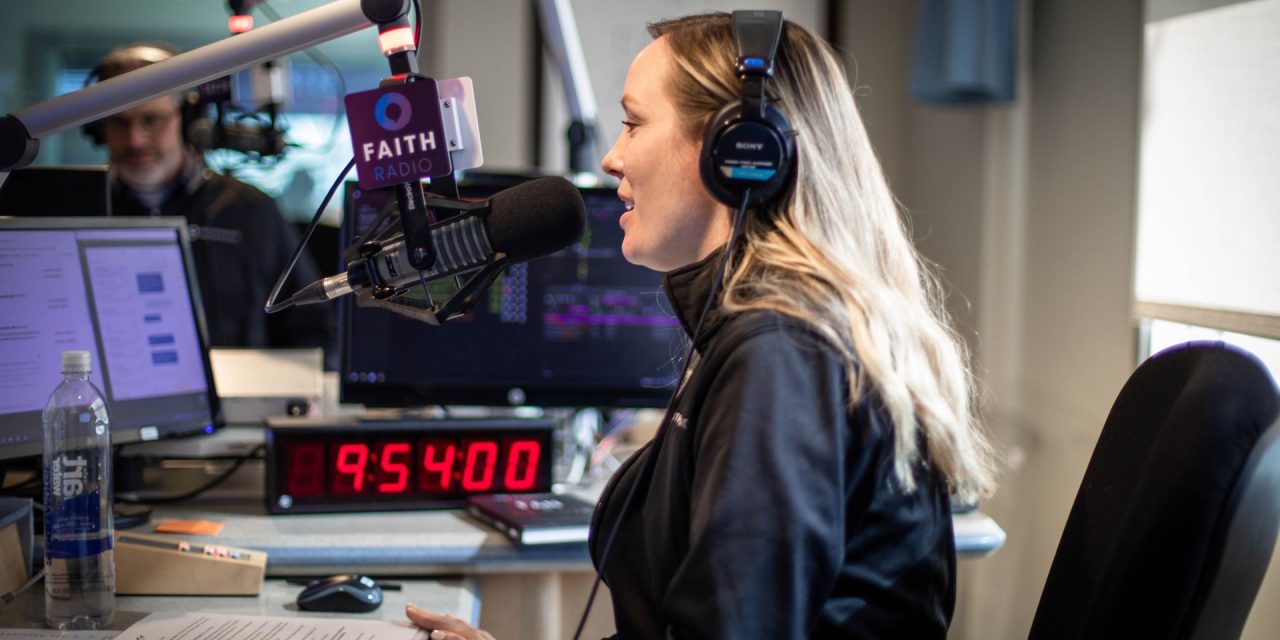NASHVILLE, Tenn. (BP)—Although AM radio can be perceived as living in the shadow of other communication platforms, its value is being recognized with the bipartisan support and passage out of Senate committee of the AM Radio for Every Vehicle Act.
One out of three American radio listeners tune in to AM stations every month, said Nic Anderson, director of government affairs for Salem Media Group.
“Even as technology changes, people are still listening to AM radio,” he said.
His concern is that auto manufacturers “are turning into another form of big tech.”
“They want control of the dashboard. They want control, and they want subscription revenue. They don’t own AM and FM radio or control the programming.”
Karisa Rogers (featured in photo above) is the manager for Northwestern Media’s Faith Radio Network, which consists of 33 signals, six of them AM. Northwestern Media is a ministry of the University of Northwestern-St. Paul.
“The presence of AM radio is important because people are still listening to it, and it’s a medium we are utilizing today to reach more people for Christ,” she said. “Our AM signals have a wider coverage area than our FM translators in the same markets.”
Casual listeners may underestimate AM’s reach.
“(It) has the profound ability to reach a large number of people geographically, and this is especially helpful in case of emergency to spread information to more households in a shorter period of time,” Rogers said.
“Signal strength is everything when it comes to listening to radio. You will be able to find FM and HD signals that have a much better overall sound, but your local AM radio signal may be more reliable in some instances.”
Moody Radio Network provides programming to affiliate stations across the country, more than 100 of them broadcasting on the AM band. Many of them are in rural communities where Christian radio is not as available on FM, said program manager Dan Craig.
“Since most radio listening takes place in the car, and people can search out new stations/formats, we hear from listeners who started listening and came to Christ,” Craig said. “To those of us in Christian Radio, we believe that the ‘SEEK’ button on the radio can lead to saving faith.”
The AM Radio for Every Vehicle Act moved easily through the markup phase in the July 27 executive session of the Senate Committee on Commerce, Science and Transportation. When it was introduced in May by Sen. Ed Markey (D-Mass), supporters came to include Senate Commerce Committee Ranking Member Ted Cruz (R-Texas).
“I am proud to have worked with Sen. Markey and our colleagues on both sides of the aisle on this legislation. It will have a big impact on our constituents who make AM radio part of their daily lives,” Cruz said July 27.
Car manufacturers had been phasing out AM receivers in electric models, they said, because the cars created electromagnetic interference with the stations. Ford, however, took things a step further by announcing that AM radio wouldn’t be available in its new models, a decision it eventually walked back.
AM radio’s place in times of disaster put it in a crucial role, Cruz said.
“(It) serves a critical function during emergencies. It reliably gets important information to the public, which is why several former FEMA administrators and representatives of the emergency response community have called for AM radio to remain in vehicles,” he said.
Troy A. Miller, president and CEO of National Religious Broadcasters, agreed about AM radio’s value.
“Not only does AM radio benefit listeners across America as an accessible platform for news, information and Christian content, but AM radio is time-tested and resilient in times of emergency,” Miller said. “We commend these lawmakers for standing with local broadcasters and developing a proposal to secure the future of AM radio in all automobiles.”
Anderson echoed those reasons, along with AM radio’s ability to provide a voice for all backgrounds. This explains the support from both Democrats and Republicans.
“(All kinds) of voices would be chilled—conservative, progressive, Christian, agricultural, foreign language formats,” he said. “This is bipartisan support you don’t see very often.
“When I’m on Capitol Hill talking to members of Congress, it’s a subject that I don’t feel worried talking to either said of the aisle about. That’s something I don’t say often.”
The AM Radio for Every Vehicle Act is co-sponsored by 27 Republican and Democrat members of the Senate.
The Salem Radio Network counts some 3,100 radio affiliates, with nearly 1,000 of them AM stations.
“Yesterday was a big day for our industry and a big day for this legislation,” Anderson said.






